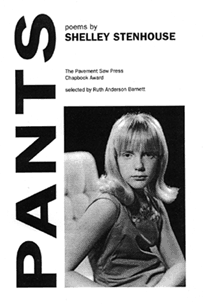
Shelley Stenhouse
Pants
Winner of the 1998-99 Chapbook Award
Chosen by Ruth Anderson Barnett
ISBN 1-886350-87-6
40 pages, 5.5 by 8.5
$6.00
OUT OF PRINT
AIDS
I couldn't help thinking about your penis,
that deflated party balloon, that old thin
dachshund hanging behind the dark curtain of
your pants. I knew I should have been thinking
how sad it is I have to lift you into a cab,
wearing a turtleneck in the middle of summer,
your huge voice booming out of a stick figure
from Hangman, with your draft dodging story,
your dinner theater story, your lecture
on the afterlife. Handing me a copy of your
voice-over tape, small legacy, while I cut up
your food. I'll forget about the money you owe me.
But I thought about your penis, put away in there,
packed away like a used catnip toy in a shoe
box, in the small dark room behind your pants,
where the ghosts of all the men and women you have
slept with are mourning, leaning over that long
thing in the coffin, mourning.
The poems in Shelley Stenhouse's Pants emerge from a childhood of privilege, one in which the speaker's father "president of something downtown / at thirty five," teaches her this primary ethic "You do what you do, you do it-- / Christ, you just do what you want"--and she learns from her mother how to squander the body on sex and booze, as though it were limitless cash. In vivid scenes, the poems show how powerful these parental lessons are, as the speaker's own adolescence and then adulthood replay the drama of promiscuity, alcohol and then drug use, and emotional alienation. In spite of legacy enacted here, the voice refuses the easy answers of tabloid and talk show stereotypes. Under the poet's unrelenting reguard, these sinners (father, mother, self) are revisited through metaphors that reveal how complex human choice and action are, and through a music that captures "that moment before things turn, that moment / when something sings..."
--Ruth Anderson Barnett
I find myself drawn to these poems--they are smart, disturbing, original. Most of all they talk to me about what matters, about pain, sorrow, joy, about the way we imagine ourselves into being.
--Francois Camoin
Shelley Stenhouse's work is raw and brave. Her words dig deep and beneath the urgent rhythms and startling images, I can tell she's trying to tell something that's true, that there's always something at stake in her writing. And for me, that's the one essential thing that has to be in a poem for me to keep reading. All of Shelley's poems take place in everyday life, most of them will make you think and laugh and feel, sometimes at the same time, and if you listen close enough, the best ones will make you feel uncomfortable, you'll wish you didn't recognize yourself so readily in them.
--Tony Gloeggler


